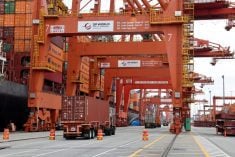WINNIPEG — A lack of buying in North and South America has put fertilizer prices under pressure.
However, no one is lining up to capitalize on the weakness, according to an industry watcher.
“Farmers aren’t in the mood to buy fall fertilizer. I think they’re more uncertain this year than they normally are,” said David Asbridge, president of NPK Fertilizer Advisory Service in Missouri.
He cites declining crop prices as the reason for the uncertainty.
Asbridge said there is definitely more supply than demand at this point, whether it’s nitrogen, phosphate or potash.
Read Also

Canadian Grain Commission to use surplus to avoid fee increases
The Canadian Grain Commission will continue to use its surplus to cover budget shortfalls and avoid potential fee increases until 2028, the federal agency announced Monday, Oct. 27.
“People hate buying into a falling market,” he said.
“They figure it is falling so they say, ‘we’ll just wait and see how much further it’s going to go down.’ “
Brazil is another big factor in the equation. Asbridge said Brazilian farmers have been reluctant to import supplies because of the weakness of its currency, the real, versus the U.S. dollar.
“They are probably 20 to 25 percent behind their total imports,” he said.
“They’ve backed out of the market at a time when they should be active, which had put a depression on the fertilizer industry.”
However, Norm Hall, president of the Agricultural Producers Association of Saskatchewan, said the pessimistic tone isn’t being felt as acutely in Canada.
“It depends on the individual,” he said.
“Some guys wait until the spring, but I always buy in the fall.”
He said he is a firm believer in buying before spring if farmers have the cash.
However, he also said there are some years when the market throws producers a curveball.
“There have been a couple of years, 2008 or 2009, we saw a huge spike of fertilizer price in the fall. Then it dropped back in the spring. That hurt,” he said.
Asbridge will likely watch ammonia more closely than other types of fertilizer.
“We’re beginning to worry because ammonia price is high relative to crop prices, so they (farmers) may switch to urea or wait until next spring,” he said.
As a result, he said the market will likely continue to ride lower for the foreseeable future.














